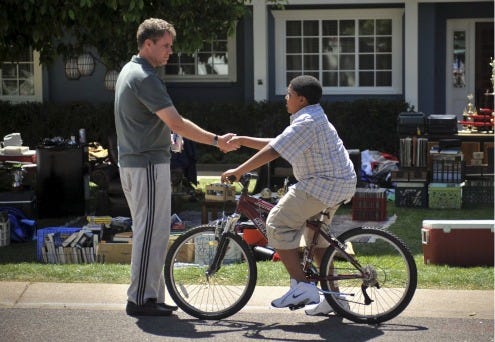Everything Must Go

"Everything Must Go" will quickly be labeled as Will Ferrell's "Punch-Drunk Love," in which juvenile funnyman Adam Sandler went into serious dramatic mode and proved he had real acting chops, when he cared to exercise them.
"Everything" isn't nearly as good, and Ferrell doesn't show nearly the range and depth Sandler did. But it's an engaging character study, solidly handled by rookie writer/director Dan Rush, that gives a little insight into the sort of career Ferrell might have had if he hadn't made his bones playing nincompoops and running around bare-assed.
"Everything Must Go" bills itself as a comedy-drama, but there are no laugh-out-loud moments or even wry smiles. The film aims to draw a portrait of human foibles, not puncture them for humorous effect. It's based on a Raymond Carver short story, "Why Don't You Dance," and he wasn't exactly a bundle of mirth.
Let's hope the studio isn't marketing this movie to Ferrell's usual fan base, because the people who enjoyed "Step Brothers" and "Land of the Lost" are going to storm out in a huff. Those who remain, though, will enjoy the film's bittersweet charms.
Ferrell plays Nick Halsey, a veteran salesman having the worst day of his life. He's fired from his well-paying job after his six months of sobriety end in a major relapse on a business trip.
After slashing the tire of his smarmy boss's (Glenn Howerton) car, he loads up on beer and arrives home to find all his possessions moved out onto the front lawn. The locks on the house are changed and a letter from his wife informs him she's left him. For good measure, his bank account is frozen and his company car is repossessed.
Lacking the means to do much of anything, Nick's ambitions end at getting plastered and camping out in his recliner. (His one bit of fortune is living in Phoenix, where it doesn't rain much or get very cold.)
The irritable next-door neighbor (Stephen Root) complains, and Nick appears about to be run off by the cops until his friend and AA sponsor Frank Garcia, a police detective, intervenes. Frank gets a permit for a five-day yard sale to get the authorities off Nick's back, after which, Frank promises, he'll come back and arrest Nick himself.
At first humiliated and angry about being a squatter on his own property, Nick soon becomes surly and resentful. He recruits Kenny (a terrific Christopher Jordan Wallace), a clever neighborhood kid left by his mother to his own devices, to coordinate his sale. Of course, he refuses to actually sell anything when made an offer.
Across the street is Samantha (Rebecca Hall), who's just moved in. Nick makes a tepid overture toward friendship and she reciprocates. She's a photographer waiting for her husband to wrap up his job in New York and join her. But after learning Nick's whole story, she finds herself the target of his less sunny side.
"I'm no different from any of you," Nick insists, indicating the whole neighborhood. "I just don't hide in my house."
"Everything Must Go" has the feel of a short story. The narrative is carefully bookended, so we can only pick up hints of Nick's life prior to meeting him. He was a high-school jock with a lousy father. Nick and his (unseen) wife have a serious fascination with Japanese culture, even turning their swimming pool into a koi pond.
And there's even the suggestion that Nick's alcoholic blackouts are more than just binges, but wellsprings of malevolent behavior. When Nick seeks out an old high-school acquaintance (Laura Dern) and she tells him he has "a good heart, and that doesn't change," we wonder if she's right.
The problem with Ferrell in this role is that his comedic persona is built around presenting a seemingly normal front, showing us the cracks in that quotidian facade, and then gleefully diving into and widening those fissures.
Watching "Everything Must Go," I kept expecting Ferrell to do a double-take and start riffing to the camera. I'm glad he never does, but the fact that we wait for it subtracts from the experience.
4 Yaps



